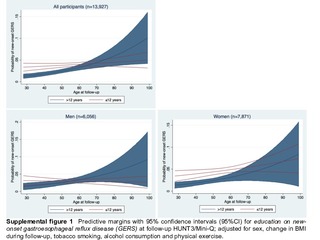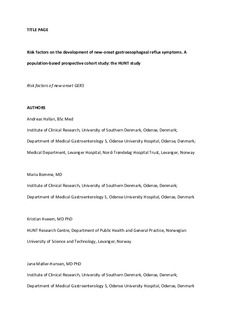| dc.description.abstract | OBJECTIVES: Gastroesophageal reflux disease (GERD) is a highly prevalent disorder. This study assessed the risk factors of new-onset gastroesophageal reflux symptoms (GERS). METHODS: The study was based on the HUNT study, a prospective population-based cohort study conducted in 1995-1997 and 2006-2009 in Nord-Trondelag County, Norway. All inhabitants from 20 years of age were invited. Risk factors of new-onset heartburn or acid regurgitation were examined using logistic regression, providing odds ratios (OR) and 95% confidence intervals (CI). RESULTS: A total of 29,610 individuals were included (61% response rate). Participants reporting no GERS at baseline and severe GERS at follow-up (new-onset GERS; n=510) were compared with participants reporting no complaints at both times (n=14,406). Increasing age (OR 1.01 per year, 95% CI 1.00-1.02) was positively associated, whereas male sex (OR 0.81, 95% CI 0.66-0.98) and higher education (OR 0.69, 95% CI 0.56-0.86) were negatively associated with new-onset GERS. Gain in body mass index (BMI) was dose-dependently associated with new-onset GERS (OR 1.30 per unit increase in BMI, 95% CI 1.25-1.35), irrespective of baseline BMI. Previous and current tobacco smoking were associated with new-onset GERS (OR 1.37, 95% CI 1.07-1.76 and OR 1.29, 95% CI 1.00-1.67, respectively). Tobacco smoking cessation was associated with new-onset GERS among those with gain in BMI upon quitting (OR 2.03, 95% CI 1.31-3.16, with >3.5 BMI units increase). CONCLUSIONS: New-onset GERS were associated with increasing age, female sex, lower education, gain in BMI, and ever tobacco smoking. Tobacco smoking cessation was associated with new-onset GERS among those who gained weight upon quitting. | nb_NO |

